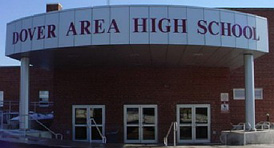- Title Page
- Introduction
- York's Newspapers
- The School Board
- A new theory
- Darwin's theory
- A legal history of evolution
- Intelligent Design
- When science meets politics
- September story
- The statement and the lawsuit
- Covering the controversy
- Holes in evolutionary theory?
- Spotlight on Dover
- The trial: The plaintiffs' case
- The trial: The defense
The statement and the lawsuit

Dover Area High School.
In early October, an anonymous donor gave 50 copies of the intelligent design textbook Of Pandas and People to the Dover Area School District. School Superintendent Richard Nilsen approved the book’s use as a reference material; because doing so was not a curriculum change, it did not require the school board’s approval. Two weeks later, on October 18, 2004, School Board Head Bonsell moved to change the ninth grade biology curriculum slightly—adding the sentence: “Students will be made aware of the gaps/problems in Darwin’s theory and of other theories of evolution, including, but not limited to, intelligent design.” The motion passed 6-3. [1] Reporter Maldonado wrote about the meeting for the next day’s paper, noting that a district biology teacher, Jen Miller, was concerned about being required to teach intelligent design.
On November 19, the school board issued a press release saying that the press—Lebo and Maldonado included—had gotten it wrong. The board had no intention of mandating the “teaching” of intelligent design; rather, they wanted students to be “made aware” of the concept. At the same time, the board released a four-paragraph statement with which they now expected teachers to introduce the evolution section of the curriculum, coming up in January. The statement pointed to “gaps in [Darwin’s] theory… for which there is no evidence.” It also noted:
Intelligent Design is an explanation of the origin of life that differs from Darwin’s view. The reference book Of Pandas and People is available in the library along with other resources for students who might be interested in gaining an understanding of what Intelligent Design actually involves.
The statement stopped short of defining intelligent design. Less than a month later, on December 14, 2004, 11 Dover parents and the ACLU filed a lawsuit to fight the curriculum change. They sought to prove that intelligent design was an attempt to introduce religion into science classrooms, and was therefore a violation of the First Amendment’s establishment clause. They planned to do so by proving that intelligent design was simply another name for creation science, whose place in public schools the courts had repudiated in 1987. Close on the heels of a divisive US presidential election in which Republicans had prevailed, the lawsuit attracted national media attention. Lebo later recalled: “The school district became a mirror to what was playing out across the country that autumn.” [2]
The school board’s statement was due to be read when Dover students reached the evolution section of the curriculum on January 13, 2005—in one month. There was no way the lawsuit would be brought to trial and resolved by then. But the plaintiffs had the option of asking a judge for an injunction against the curriculum change. Meanwhile, on Thursday, January 1, all but one of the teachers in the Dover High School science department signed a letter refusing to read the statement.